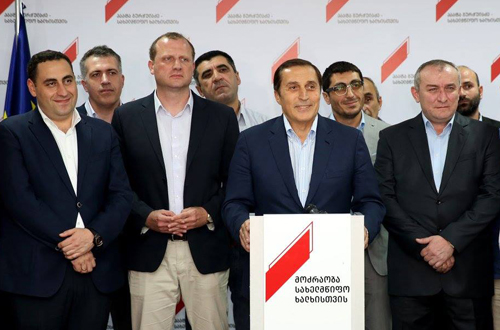
Ahead of Parliamentary Elections, Georgian Establishment Descends Into Political Mudslinging
Publication: Eurasia Daily Monitor Volume: 13 Issue: 148
By:

On September 2, Georgia’s State Audit Office (SAO) fined a ruling Georgian Dream (GD) party member and its affiliated organization, as well as the donors to two opposition parties—the Alliance of Patriots and State for People—for illegal donations. The SAO’s actions appeared to reflect this government agency’s commitment to preserving fairness in the ongoing Georgian election campaign, keeping all players within the boundaries of the law. Yet, upon closer inspection, the “fairness” argument begins to break down. Specifically, the SAO fined the GD member and GD’s affiliate, Georgian Dream–Healthy Future, only 4,000 Georgian lari (roughly equivalent to $1,700). The Alliance of Patriots’ donor, on the other hand, was fined 183,000 lari ($79,500), and the State for People party donors received a penalty of 39,000 lari ($16,900) (Civil Georgia, September 2). Based on this discrepancy, it would appear that the ruling regime is trying to financially weaken its political opponents, albeit under a shakily disguised pretense of impartiality.
The use of government agencies for the purpose of crippling one’s political adversaries is common practice in Georgian politics. Ironically, the previous administration fined Georgian Dream—then in the opposition—for tens of millions of lari for alleged illegal donations, which caused an uproar (Foreignpress.ge, June 12, 2016). Once in power, however, GD quickly forgot its bitter experiences and began to apply the same tactics against its own opponents—though, thus far, on a much smaller scale.
With the October 8 parliamentary elections less than a month away, Georgian political parties are increasingly engaging in unreserved political mudslinging. Consequently, this election may end up being one of the dirtiest in Georgian memory. Meaningful, healthy political debate has been sorely lacking so far, with scant exchange of ideas or solid programs for how to bring the country out from its deep economic and political malaise. On the other hand, all sides have been highly active in trying to discredit each other by any means.
On August 22, Eliso Kiladze, an editor-in-chief of the Georgian newspaper Chronika Plus, released an incriminating video tape featuring Paata Burchuladze, a world renowned Georgian opera singer and the founder and leader of the political party State for People. Burchuladze is shown at a church baptism ceremony and a subsequent a lavish party, participating as the godfather to the son of Tariel Onioani, a notorious Georgian mafia boss (Rustavi 2, Tabula TV, August 22). The video substantiated long-rumored assumptions in Georgian society that Burchuladze had close ties with the Georgian mafia. Even the State for People founder could not ignore the allegations after the release of this video, confirming that he indeed is godfather to Oniani’s son (Imedi TV, August 22). It yet to be seen how this particular revelation may damage Burchuladze’s political standing with the Georgian electorate.
Nonetheless, the opera singer–turned–politician tried to hit back. Burchuladze threatened to release video tapes showing how the country’s security services apply pressure to his party members (Timesnews.ge, August 23; Dailypress.ge, August 26). He has yet to provide such tapes.
Political attacks have also materialized against the former ruling, and now opposition, United National Movement (UNM) party. Last week (September 6), Goga Khaindrava, a self-styled Georgian filmmaker and former state minister for conflict resolution under then-president Mikhail Saakashvili, released a documentary film titled Herocratia. Khaidrava had a falling out with Saakashvili, and he has since become the former Georgian president’s bitter enemy. Herocratia presents, in graphic detail, alleged human rights abuses carried out under Saakashvili’s rule, once again unnerving Georgian society (Imedi TV, September 6). With Khaindarava’s close ties to the current Georgian government widely known, it was not difficult to conclude who ordered the film to be made and why it was released less than a month before the election. Clearly, GD is attempting to warn Georgians against voting for UNM and bringing them back to power.
One year ago, long before the election campaign really started to heat up, UNM threatened to release its own secret video tape. This purported footage supposedly shows Bidzina Ivanishvili, the Georgian billionaire and de-facto leader of GD, meeting with a hitman. Allegedly, on the tape, Ivanishvili is ordering the assassin-for-hire to kill Erosi Kitsmarishvili, a Georgian businessmen, politician, and former owner of the Rustavi 2 television channel (Scandal.ge, October 19, 2015). In July 2014, Kitsmarishvili committed suicide in his garage (Civil Georgia, July 15, 2014). However, the death of such a high-profile businessman and politician produced a lot of speculations about the cause of his death (Premieri.ghn.ge, September 13, 2016). UNM has yet to deliver on its alleged threat, but this month—the peak of the election campaign—might finally see the release of this and many other scandalous audio and video tapes.
The Georgian Labor Party (LP) and its colorful leader, Shalva Natelashvili, did not escape the political mudslinging either. Soso Shatberashvili, who earlier defected from LP, accused Natelashvili of receiving direct payments from UNM since 2011, in exchange for his vociferous opposition to Bidzina Ivanishvili (Marshalpress.ge, April 26, 2016). Natelashvili hit back. Trying to distance himself from UNM, he in turn accused UNM and GD of being in a secret alliance (Ipress.ge, August 16).
Paradoxically, the one political party that has so far been relatively spared such vehement political attacks has been the pro-Russian Democratic Movement–United Georgia and its leader, Nino Burjanadze. Not long ago, Burjanadze floated the idea of declaring Georgia a “non-bloc country.” Such a step, if adopted, would effectively prevent any future prospects for Georgian membership in the North Atlantic Treaty Organization (NATO) (Interpressnews.ge, August 18, 2016). It is not yet clear how much political traction Burjanadze’s new initiative will gain with the Georgian electorate, even if she manages to avoid being harmed by any new political maneuverings against her.
Georgia’s parliamentary elections are just around the corner, and the political establishment has rapidly descended to aggressive mudslinging. Despite, the country’s intractable domestic problems and unresolved security threats, healthy political debate has been almost wholly replaced by a brutal war of accusations and backstabbing. It remains to be seen how far the Georgian political elites will go to undermine one another over the coming month and what long-term impact this may have on the country’s internal stability or external security.




